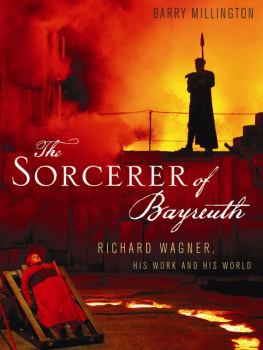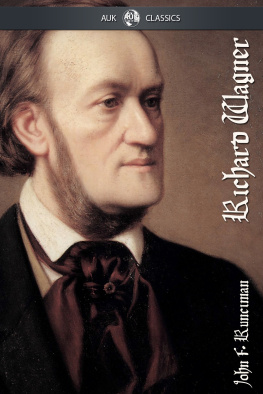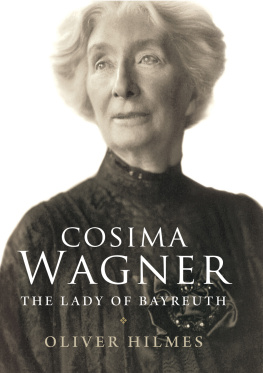Richard Wagner - My Life
Here you can read online Richard Wagner - My Life full text of the book (entire story) in english for free. Download pdf and epub, get meaning, cover and reviews about this ebook. year: 2018, publisher: Seltzer Books, genre: Non-fiction. Description of the work, (preface) as well as reviews are available. Best literature library LitArk.com created for fans of good reading and offers a wide selection of genres:
Romance novel
Science fiction
Adventure
Detective
Science
History
Home and family
Prose
Art
Politics
Computer
Non-fiction
Religion
Business
Children
Humor
Choose a favorite category and find really read worthwhile books. Enjoy immersion in the world of imagination, feel the emotions of the characters or learn something new for yourself, make an fascinating discovery.
- Book:My Life
- Author:
- Publisher:Seltzer Books
- Genre:
- Year:2018
- Rating:4 / 5
- Favourites:Add to favourites
- Your mark:
- 80
- 1
- 2
- 3
- 4
- 5
My Life: summary, description and annotation
We offer to read an annotation, description, summary or preface (depends on what the author of the book "My Life" wrote himself). If you haven't found the necessary information about the book — write in the comments, we will try to find it.
This translation first published in 1911. According to Wikipedia: Wilhelm Richard Wagner (22 May 1813, Leipzig, Germany 13 February 1883, Venice, Italy) was a German composer, conductor, theatre director and essayist, primarily known for his operas (or music dramas, as they were later called). Unlike most other great opera composers, Wagner wrote both the scenario and libretto for his works. Franz Liszt (October 22, 1811 July 31, 1886) was a Hungarian composer, virtuoso pianist and teacher.
My Life — read online for free the complete book (whole text) full work
Below is the text of the book, divided by pages. System saving the place of the last page read, allows you to conveniently read the book "My Life" online for free, without having to search again every time where you left off. Put a bookmark, and you can go to the page where you finished reading at any time.
Font size:
Interval:
Bookmark:

Published by Seltzer Books
established in 1974, now offering over 14,000 books
feedback welcome: seltzer@seltzerbooks.com
Biographies of musicians, available from Seltzer Books:
Love Affairs of Great Musicians by Hughes
Among the Great Masters of Music by Rowlands
Beethoven: a Character Study by Fischer
Beethoven's Letters
Chopin and Other Musical Essays by Finck
Mozart, the Man and the Artist by Kerst
Life of Chopin by Liszt
Wagner by Runciman
My Life by Wagner
The World's Great Men of Music by Brower
Musical Memories by Saint-Saens
Haydn by Hadden
Handel by Dent
Great Itallian and French Composers by Ferris
Great German Composers by Ferris
Edward MacDowell, a Great American Tone Poet by Porte
English translation
New York, 1911
The contents of these volumes have been written down directly from my dictation, over a period of several years, by my friend and wife, who wished me to tell her the story of my life. It was the desire of both of us that these details of my life should be accessible to our family and to our sincere and trusted friends; and we decided therefore, in order to provide against a possible destruction of the one manuscript, to have a small number of copies printed at our own expense. As the value of this autobiography consists in its unadorned veracity, which, under the circumstances, is its only justification, therefore my statements had to be accompanied by precise names and dates; hence there could be no question of their publication until some time after my death, should interest in them still survive in our descendants, and on that point I intend leaving directions in my will.
If, on the other hand, we do not refuse certain intimate friends a sight of these papers now, it is that, relying on their genuine interest in the contents, we are confident that they will not pass on their knowledge to any who do not share their feelings in the matter.
Richard Wagner
I was born at Leipzig on the 22nd of May 1813, in a room on the second floor of the 'Red and White Lion,' and two days later was baptized at St. Thomas's Church, and christened Wilhelm Richard.
My father, Friedrich Wagner, was at the time of my birth a clerk in the police service at Leipzig, and hoped to get the post of Chief Constable in that town, but he died in the October of that same year. His death was partly due to the great exertions imposed upon him by the stress of police work during the war troubles and the battle of Leipzig, and partly to the fact that he fell a victim to the nervous fever which was raging at that time. As regards his father's position in life, I learnt later that he had held a small civil appointment as toll collector at the Ranstadt Gate, but had distinguished himself from those in the same station by giving his two sons a superior education, my father, Friedrich, studying law, and the younger son, Adolph, theology.
My uncle subsequently exercised no small influence on my development; we shall meet him again at a critical turning-point in the story of my youth.
My father, whom I had lost so early, was, as I discovered afterwards, a great lover of poetry and literature in general, and possessed in particular an almost passionate affection for the drama, which was at that time much in vogue among the educated classes. My mother told me, among other things, that he took her to Lauchstadt for the first performance of the Braut von Messina, and that on the promenade he pointed out Schiller and Goethe to her, and reproved her warmly for never having heard of these great men. He is said to have been not altogether free from a gallant interest in actresses. My mother used to complain jokingly that she often had to keep lunch waiting for him while he was paying court to a certain famous actress of the day [FOOTNOTE: Madame Hartwig]. When she scolded him, he vowed that he had been delayed by papers that had to be attended to, and as a proof of his assertion pointed to his fingers, which were supposed to be stained with ink, but on closer inspection were found to be quite clean. His great fondness for the theatre was further shown by his choice of the actor, Ludwig Geyer, as one of his intimate friends. Although his choice of this friend was no doubt mainly due to his love for the theatre, he at the same time introduced into his family the noblest of benefactors; for this modest artist, prompted by a warm interest in the lot of his friend's large family, so unexpectedly left destitute, devoted the remainder of his life to making strenuous efforts to maintain and educate the orphans. Even when the police official was spending his evenings at the theatre, the worthy actor generally filled his place in the family circle, and it seems had frequently to appease my mother, who, rightly or wrongly, complained of the frivolity of her husband.
How deeply the homeless artist, hard pressed by life and tossed to and fro, longed to feel himself at home in a sympathetic family circle, was proved by the fact that a year after his friend's death he married his widow, and from that time forward became a most loving father to the seven children that had been left behind.
In this onerous undertaking he was favoured by an unexpected improvement in his position, for he obtained a remunerative, respectable, and permanent engagement, as a character actor, at the newly established Court Theatre in Dresden. His talent for painting, which had already helped him to earn a livelihood when forced by extreme poverty to break off his university studies, again stood him in good stead in his position at Dresden. True, he complained even more than his critics that he had been kept from a regular and systematic study of this art, yet his extraordinary aptitude, for portrait painting in particular, secured him such important commissions that he unfortunately exhausted his strength prematurely by his twofold exertions as painter and actor. Once, when he was invited to Munich to fulfil a temporary engagement at the Court Theatre, he received, through the distinguished recommendation of the Saxon Court, such pressing commissions from the Bavarian Court for portraits of the royal family that he thought it wise to cancel his contract altogether. He also had a turn for poetry. Besides fragments--often in very dainty verse--he wrote several comedies, one of which, Der Bethlehemitische Kindermord, in rhymed Alexandrines, was often performed; it was published and received the warmest praise from Goethe.
This excellent man, under whose care our family moved to Dresden when I was two years old, and by whom my mother had another daughter, Cecilia, now also took my education in hand with the greatest care and affection. He wished to adopt me altogether, and accordingly, when I was sent to my first school, he gave me his own name, so that till the age of fourteen I was known to my Dresden schoolfellows as Richard Geyer; and it was not until some years after my stepfather's death, and on my family's return to Leipzig, the home of my own kith and kin, that I resumed the name of Wagner.
The earliest recollections of my childhood are associated with my stepfather, and passed from him to the theatre. I well remember that he would have liked to see me develop a talent for painting; and his studio, with the easel and the pictures upon it, did not fail to impress me. I remember in particular that I tried, with a childish love of imitation, to copy a portrait of King Frederick Augustus of Saxony; but when this simple daubing had to give place to a serious study of drawing, I could not stand it, possibly because I was discouraged by the pedantic technique of my teacher, a cousin of mine, who was rather a bore. At one time during my early boyhood I became so weak after some childish ailment that my mother told me later she used almost to wish me dead, for it seemed as though I should never get well. However, my subsequent good health apparently astonished my parents. I afterwards learnt the noble part played by my excellent stepfather on this occasion also; he never gave way to despair, in spite of the cares and troubles of so large a family, but remained patient throughout, and never lost the hope of pulling me through safely.
Font size:
Interval:
Bookmark:
Similar books «My Life»
Look at similar books to My Life. We have selected literature similar in name and meaning in the hope of providing readers with more options to find new, interesting, not yet read works.
Discussion, reviews of the book My Life and just readers' own opinions. Leave your comments, write what you think about the work, its meaning or the main characters. Specify what exactly you liked and what you didn't like, and why you think so.













